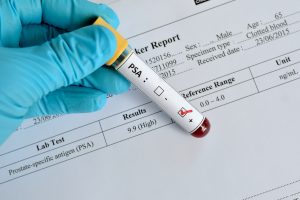The efficacy of a single prostate specific antigen (PSA) screening intervention as a prevention strategy is a controversial topic and the data on this subject are much debated: now a huge British trial recently published on JAMA concluded that it is not effective in reducing prostate cancer mortality.
 To assess the effect of a low intensity PSA based screening intervention on prostate cancer mortality, the authors performed a randomized clinical trial (CAP, Cluster Randomized Trial of PSA Testing for Prostate Cancer), among more than 400.000 men. The sample was divided in a control and an intervention group: in the latter, participants were invite to attend a PSA testing clinic and receive a single PSA test while the control group remained unscreened. The primary care visits took place between 2001 and 2009; a total of 67.313 (36%) underwent a one time PSA test.
To assess the effect of a low intensity PSA based screening intervention on prostate cancer mortality, the authors performed a randomized clinical trial (CAP, Cluster Randomized Trial of PSA Testing for Prostate Cancer), among more than 400.000 men. The sample was divided in a control and an intervention group: in the latter, participants were invite to attend a PSA testing clinic and receive a single PSA test while the control group remained unscreened. The primary care visits took place between 2001 and 2009; a total of 67.313 (36%) underwent a one time PSA test.
Although the results show an increase in the detection of prostatic cancer, the difference in the numbers of death was not significant: 549 (0,30 per 1000 person-years) in the PSA group died of prostate cancer versus 647 (0,31 per 1000 person-years) in the control group. After 10 years, the conclusion is that a single screening might not be useful; the participants will be followed up for at least another 5 years, to study if a longer-term mortality benefit emerges with more time.
“How “active” active surveillance needs to be and which men are candidates?” asks MD Michael J. Barry in the accompanying editorial. The best solution should be, at the same time, to avoid overtreatment of those who have low risk and to avoid under treatment of those who have high risk. In a biological sense, of course, screening does not cause prostate cancer, but in a practical sense, it does: the European Randomized Study of Screening for Prostate Cancer (ERSPC) analyses benefits and harms of periodic screening (2-4 years). A higher number of men were detected with prostatic cancer, and this overdiagnosis caused more anxiety and stress, but no benefits in mortality. Nevertheless, a follow up from ERSPC has seen increase in the absolute benefit of periodic screening over time.





